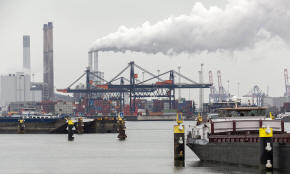Port of Rotterdam feels impact of sanctions on Russia
 Send a link to a friend
Send a link to a friend
 [April 25, 2022] By
Toby Sterling [April 25, 2022] By
Toby Sterling
AMSTERDAM (Reuters) - Europe's biggest port
Rotterdam said that goods throughput fell by 1.5% in the first quarter
as trade was hit by the impact of sanctions on Russia, and it expects
the conflict in Ukraine to hit volumes for the full year.
In 2021, 30% of oil imports via Rotterdam were from Russia, while 25% of
its liquefied natural gas imports came from Russia and 20% of coal that
arrived in the Dutch port.
The Port of Rotterdam said it was too early to judge how much volumes
from Russia had fallen but "by now in virtually all sectors the impact
is visible from the sanctions and the decisions by individual companies
not to do business with Russia."
The port said that falling container volumes to Russia had become
apparent in March as most shipping companies stopped taking Russian
container bookings, and most deep-sea terminals had halted exports as
well.
Russian oil, coal and gas are not yet subject to European sanctions, but
some companies, including Shell, have stopped or slowed doing business
with Russian companies voluntarily and ahead of likely further
sanctions.
The port said that 113.6 million tonnes of goods in total were
transhipped via Rotterdam in the first quarter of 2022, down from 115.2
million in the same period of 2021.
"We expect that the developments in Ukraine and the greatly worsened
relationship between Russia and many other countries will impact
throughput volumes in the rest of the year as well," Port of Rotterdam
CEO Allard Castelein said in a statement.
[to top of second column] |

A container terminal is seen in the port of Rotterdam, the
Netherlands, March 21, 2016. REUTERS/Michael Kooren/File Photo

The loss of trade with Russia was partly offset by rising trade elsewhere.
"Since March, oil companies are taking less oil from Russia," the port said,
noting that the overall volume of raw oil imported had remained almost flat at
25.5 million tonnes.
LNG imports jumped 78% in the first quarter from a year earlier to 2.7 million
tonnes.
The port noted that high prices had hit German steel production, contributing to
a 20% fall in iron ore imports.
Disruptions to trade from China due to lockdowns there also posed a risk.

"In the first quarter the consequences of the COVID lockdowns in Shanghai were
not yet visible in Rotterdam," the port said.
(Reporting by Toby Sterling; Editing by David Goodman and Susan Fenton)
[© 2022 Thomson Reuters. All rights
reserved.]This material may not be published,
broadcast, rewritten or redistributed.
Thompson Reuters is solely responsible for this content. |